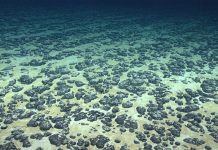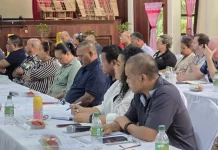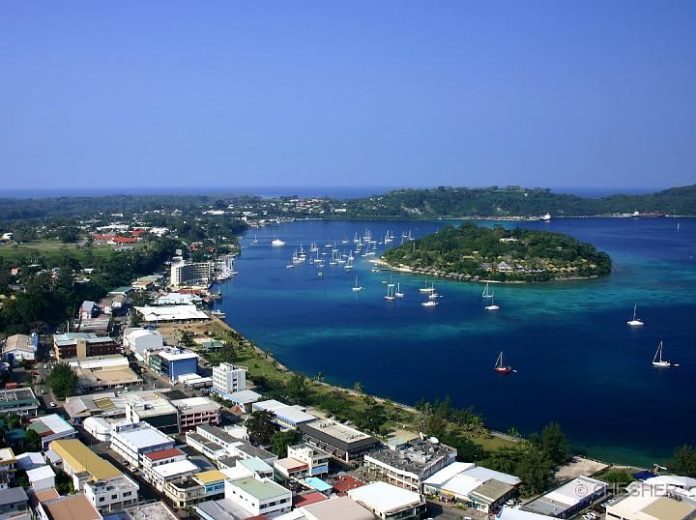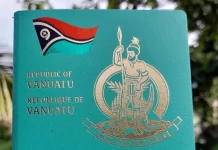Vanuatu, one of the last Covid hermit nations, is set to open up to international travel, but there are concerns the country is not ready to restart tourism, with a lack of deals with foreign airlines posing a significant problem.
From 01 July, international tourists will be able to return to Vanuatu, a country of 300,000 people three hours from Australia, which has had some of the toughest border restrictions in the world through the pandemic.
Vanuatu closed its borders to visitors in March 2020, only allowing a capped number of residents and visa holders to return throughout this period, with strict quarantine requirements.
But from next month, the rules will relax almost completely, there will be no quarantine or arrival caps, with travellers – vaccinated or unvaccinated – allowed to enter the country if they can show a certified negative rapid antigen test taken 24 hours before arrival.
The tourism-dependent country is keen to get visitors back, particularly as nearby Pacific nations, including Fiji and Samoa, reopen to tourists. Before the pandemic, tourism made up around 40% of GDP. In April 2020, just a few months into the pandemic, the Vanuatu government estimated that 70% of tourism jobs had been lost due to Covid-19. Last year, the Vanuatu government estimated the combined economic cost of Covid-19 and Cyclone Harold at around $850m.
However, there have been concerns that the tourism industry is not ready for travel to resume, with a particular concern about the lack of deals with foreign airlines for travel into Vanuatu.
Currently travel to Vanuatu is only possible through Air Vanuatu, the country’s beleaguered national carrier, which only has two aircraft for its international operations. There are concerns that if anything were to happen to the heavily indebted national airline, Vanuatu would become a hermit nation once again.
Air Vanuatu turned on its online booking system at the end of April, with Air Vanuatu chief commercial officer Greg Wilson saying bookings for travel “are starting to look healthy”.
“We have a very strong demand for New Zealand, the majority of which are seasonal workers wanting to come home, but we are seeing very good numbers starting to come in,” Wilson said.
The national carrier will also resume its services to the national capital Port Vila, from major Australian capital cities – Brisbane, Sydney and Melbourne. It has also scheduled flights to New Zealand, Fiji and the Solomon Islands.
The Vanuatu Tourism Office’s CEO, Adela Issachar Aru, told the Guardian that Vanuatu has been working hard to get ready for the reopening, with air connectivity a significant component of the nation’s tourism recovery strategy.
On Tuesday, Virgin Australia announced it would start direct services from Brisbane to Port Vila from March 2023, with up to five flights a week.
“Vanuatu stands ready to welcome Australians back to our shores from 01 July and the Virgin Australia scheduled flights from Brisbane to Port Vila provide even more choice for Australians answering the call of Vanuatu,” said Issachar Aru, who added that talks are also underway with Qantas and Air Cal.
She said the industry understood the importance of connectivity and that if not addressed in time, Vanuatu would lose out to other markets in the Pacific that are also reopening.
“Even though we have not yet secured the approvals of the other foreign airlines coming into the country.”
Glen Craig, the chair of the Vanuatu Business Resilience Council, says he views air connectivity as one of Vanuatu’s significant risks. The only operator currently scheduled to fly in and out of Vanuatu is the national carrier, Air Vanuatu.
The airline is heavily in debt and has repeatedly relied on government bailouts to stay in the air.
“Vanuatu is dependent on its heavily indebted national airline, which is the only airline that flies to New Zealand, one of Vanuatu’s top three markets, and to Australia, which is our main market,” Craig said. “If something went wrong with the national carrier, which is making huge losses, and the government couldn’t fund it, we would be in some difficulties.”
The opposition leader, Ralph Regenvanu, is less optimistic about the nation’s readiness.
“We have to open up, but we are definitely not ready. There are no confirmed agreements for [foreign] airlines to fly to Vanuatu. We’ve got a few weeks yet, so we can only hope something happens,” Regenvanu said.
“I think we all have our hopes up about the opening of the country for tourism, but I think we are going to be disappointed.”
Vanuatu’s closed borders meant it kept out the Delta variant of coronavirus. Omicron swept through the country earlier this year and has now been recorded in all six provinces. But hospitalisations and deaths due to Covid have been few, with just 14 recorded deaths and 10,500 cases. Just under 40% of the population is fully vaccinated.
Sophia Rodwell, acting manager at the Holiday Inn, one of the capital’s largest full-service resorts, says the industry is excited to welcome people back. She says the resort is well staffed and well-prepared.
“Like any well-executed plan, we have been working in stages,” Rodwell said.
First arrivals into the country are expected to be those visiting family and friends, with hopes for growth in wider tourism arrivals in the months ahead.
“The big change in the industry’s tourism plan was to maximise its natural assets when compared to markets such as Fiji,” Rodwell said.
“So, white sand beach? Tick. Surf? Tick. Reef? Tick, but Vanuatu also has much more. It’s got blue holes, it has the jungle, it has waterfalls, and so our positioning really leans heavily on that.”
For smaller tourism operators, such as family bungalow owners and small tour operators hard hit by more than two years of no income, the government has initiated a low-interest loans program to allow them to rebuild.
But there are concerns about the state of the tourism infrastructure across the main islands, with many considering it will take time for the tourism sector to rebuild and retrain new staff.
SOURCE: THE GUARDIAN/PACNEWS











